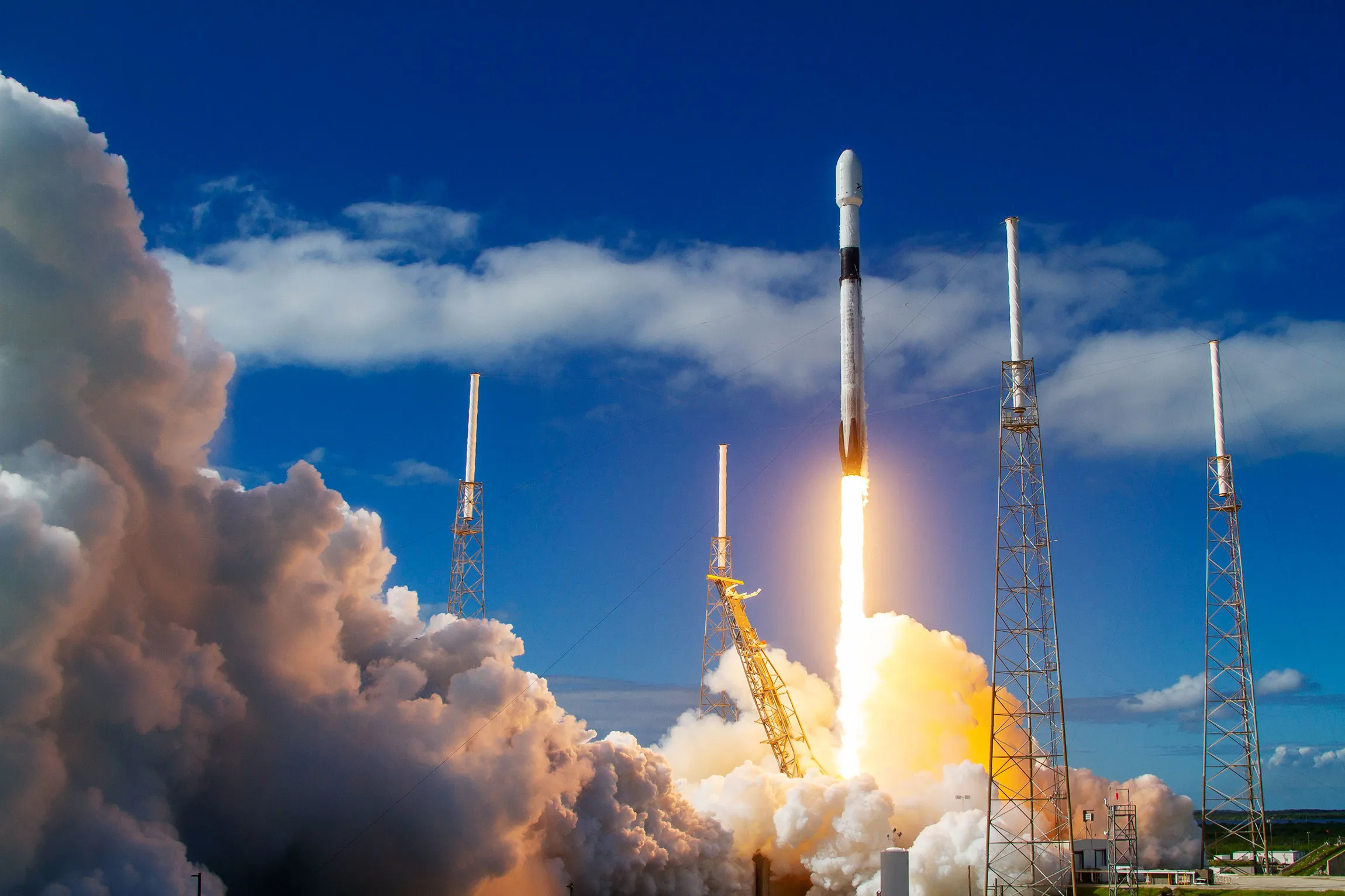SpaceX has been making headlines with its ambitious Starlink project, aiming to provide high-speed internet access worldwide, especially in remote and underserved regions. On January 24, 2025, SpaceX launched another batch of 23 Starlink satellites into low Earth orbit. This was their 11th Falcon 9 rocket mission of the year and the 23rd launch for this particular booster. The launch took place at Vandenberg Space Force Base in California, and the first-stage booster successfully returned to Earth, landing on the drone ship “Of Course I Still Love You” in the Pacific Ocean. With this latest launch, the Starlink constellation now includes more than 6,900 operational satellites.
While SpaceX’s achievements are commendable, their growing dominance in the satellite industry presents several economic, security, and strategic challenges. This blog post explores the potential implications of SpaceX satellite dominance and discusses how European countries and other stakeholders can address these concerns.
The Economic Impact of SpaceX’s Satellite Dominance
While SpaceX’s efforts to bridge the digital divide are commendable, their rapid expansion raises economic concerns. A monopoly in satellite internet services could stifle competition, making it challenging for other companies, including those in Europe, to compete. This dominance could lead to higher costs for consumers and reduced innovation within the industry.
Europe’s Response to SpaceX
The European Space Agency (ESA) has ramped up its investment in satellite technology, collaborating with local companies to launch new constellations aimed at providing alternative services to Starlink.
Security and Strategic Implications
Dependence on a single entity for satellite services can create vulnerabilities. European countries may find themselves reliant on SpaceX for critical communications infrastructure, posing strategic risks if geopolitical tensions arise. Ensuring autonomy and security in space technology becomes essential to safeguard national interests. The dominance of a non-European company could limit a region’s ability to make independent decisions, affecting national security in terms of data privacy, surveillance, and secure communications.
Expert Opinion:
Dr. Jane Smith, a renowned space policy analyst, states, “The growing dependence on SpaceX’s satellite services can have far-reaching implications for national security and sovereignty. It’s crucial for countries to develop their own capabilities to ensure strategic autonomy.”
Potential Solutions to Address SpaceX’s Satellite Dominance
1. Investment in Domestic Capabilities
To reduce dependence on external entities, European countries can invest in their own space programs and technologies. By developing homegrown capabilities and launching their own satellites, they can ensure greater control over their infrastructure and mitigate risks associated with reliance on foreign companies.
2. International Collaboration
Collaboration with other countries and companies can foster innovation and create a more balanced space economy. Joint ventures and partnerships can help share the costs and risks associated with space exploration and satellite deployment. By working together, nations can pool their resources and expertise to address common challenges.
3. Regulatory Frameworks
Developing and implementing international regulations and guidelines is crucial to ensure fair competition and prevent monopolistic practices. Policies on satellite deployment, spectrum allocation, and data privacy can help create a level playing field and protect the interests of all stakeholders.
4. Encouraging Competition
Supporting and encouraging other companies to enter the satellite internet market can create a healthier competitive environment. Incentives, subsidies, and favorable policies can help new entrants establish themselves and compete with established players like SpaceX.
Environmental Impact
The manufacturing, launching, and eventual deorbiting of satellites have environmental implications. Efforts are needed to minimize the carbon footprint and ensure sustainable practices in the space industry. SpaceX and other companies must adopt eco-friendly technologies and practices to mitigate the impact of their activities on the environment.
Space Debris and Light Pollution
The increasing number of satellites in low Earth orbit raises concerns about space debris and light pollution. Collisions between satellites or with existing space debris can create even more fragments, posing a threat to other spacecraft and satellites. Additionally, the large number of satellites can contribute to light pollution, affecting astronomical observations and research. Addressing these challenges requires ongoing advancements in technology and international cooperation.

Military and Geopolitical Implications
SpaceX’s advancements have also caught the attention of military organizations. The U.S. Department of Defense is considering using SpaceX’s Starship for rapid global transportation of cargo and personnel, potentially revolutionizing military logistics.
China and other Eastern countries have expressed concerns over SpaceX’s growing influence in space. China has criticized the U.S. for “close encounters” between its space station and Starlink satellites, accusing the U.S. of irresponsible behavior in space. This has led to increased tensions and discussions about space sovereignty and international treaties.
Eastern countries, particularly China, have been vocal about their concerns. China has accused the U.S. of threatening global security with SpaceX’s spy satellites. This has led to a call for vigilance and protection against new security threats.
In response to satellite dominance, countries like China are accelerating their own satellite programs. This could lead to a new era of space competition, with nations vying for control over Earth’s observation and communication networks. The geopolitical landscape is likely to be reshaped as countries develop countermeasures and strategies to maintain their influence and security.
Historical Context
Since the launch of Sputnik in 1957, the space industry has evolved dramatically. The introduction of reusable rockets by SpaceX has reduced the cost of launching satellites, making space more accessible. However, this rapid growth also brings new challenges that were not present in the early days of space exploration.
Ethical Considerations
The ethical implications of satellite technology cannot be ignored. Concerns about privacy, surveillance, and the responsibility of companies in managing space traffic are becoming increasingly important. Companies must navigate these ethical dilemmas carefully to ensure the responsible use of space.
Future Outlook
Looking ahead, the satellite industry is poised for further growth. SpaceX’s activities are likely to shape the next decade, with increasing competition, advancements in technology, and new regulatory frameworks. The future of space will depend on how well countries and companies can balance the benefits of satellite networks with the need to address potential risks.
Balancing the Benefits and Risks: The Future of SpaceX’s Satellite Dominance
While SpaceX’s achievements in space technology are commendable, its growing dominance in the satellite industry presents several challenges that must be addressed. By investing in domestic capabilities, fostering international collaboration, developing regulatory frameworks, and encouraging competition, European countries can ensure a balanced and secure future for satellite technology and internet services. As we navigate this new era of space exploration, it is essential to strike a balance between harnessing the benefits of satellite networks and mitigating the potential risks.
Interested in staying informed about the latest developments in space technology and satellite innovation? Subscribe to our newsletter for the most up-to-date news, expert opinions, and in-depth analyses delivered straight to your inbox. Join the conversation and be a part of the future of space exploration!






